Central African Federation
If the first public utterance of Sir Godfrey Huggins, the Prime Minister of Southern Rhodesia, since his arrival in London is any criterion the prospects of the impending talks on Central African Federation are not bright. To begin with, the fact that talks are going forward on a high level without the participation of any Africans will in itself intensify the suspicion which the Africans already entertain of the whole scheme. In the second place, when Sir Godfrey rejects sum- marily the proposal for a Minister for Native Affairs in the Federal Parliament, an integral and essential part of the scheme drawn up in London last year, the Africans of Northern Rhodesia and Nyasaland, who, rightly or wrongly, contrast the rule of the White King (actually the rule of Whitehall) with the rule of Sir Godfrey Huggins, will be only confirmed in their opposition to a scheme which they believe puts Southern Rhodesia in a dominant position. The course of the talks in London may have the effect of changing some of Sir Godfrey Huggins' views, though that seems improbable. It must ft any rate be made absolutely plain by the Colonial Secretary that there can be no question of forcing federation on the native populations of the three territories, particularly the northern two, against their will. The economic advantages of federation would no doubt be considerable, but many economic under- standings can be reached without political union. Certainly Whitehall must not relax its beneficent hold on Northern Rhodesia and. Nyasaland lightly.


































 Previous page
Previous page